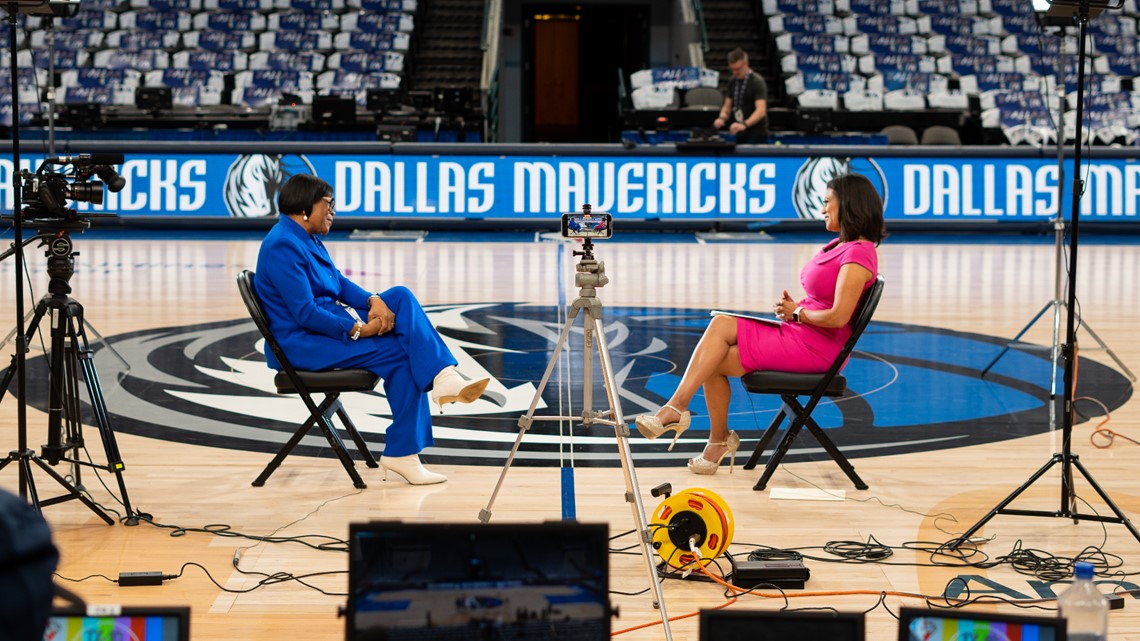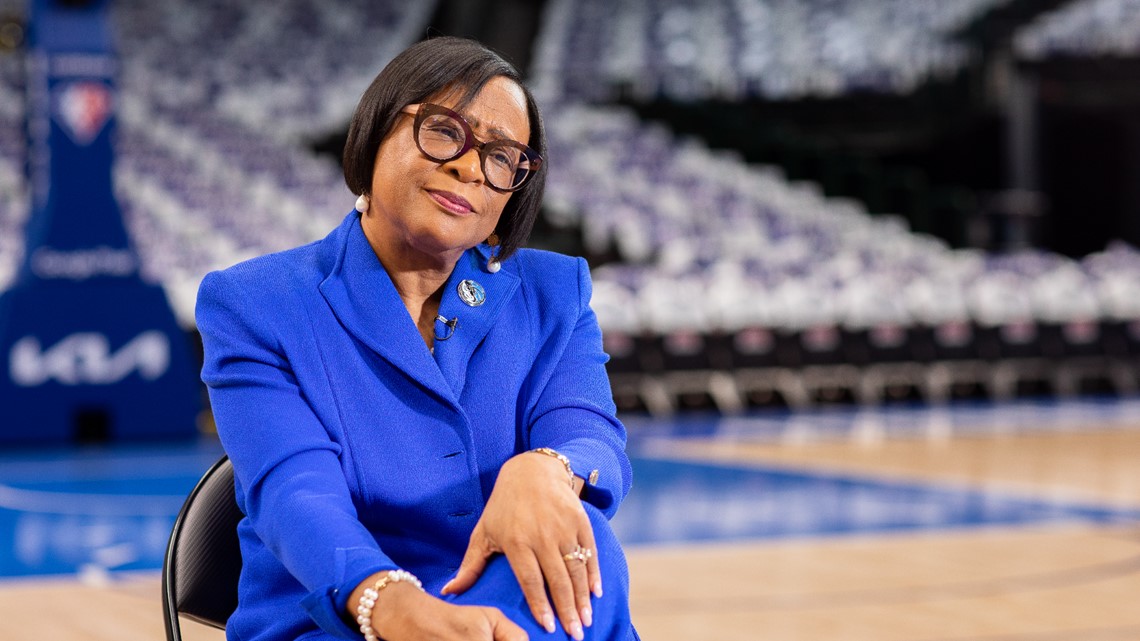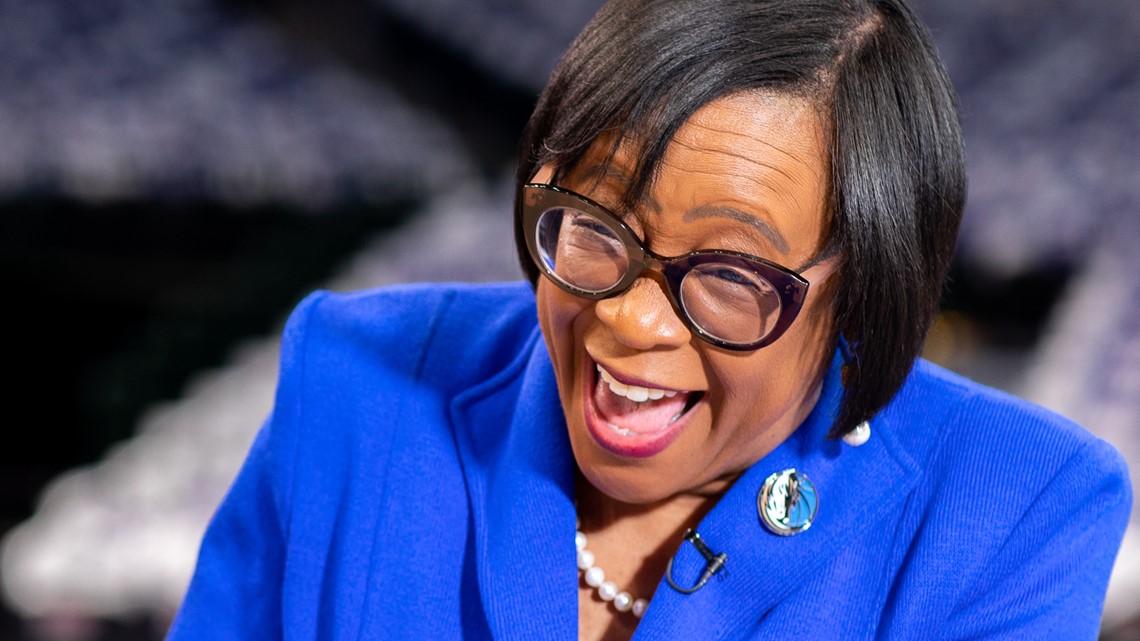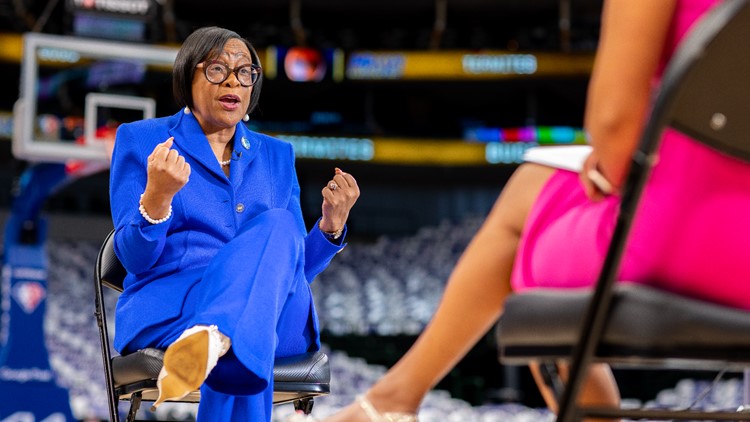DALLAS — The Mavs are currently in their longest playoff run since 2011.
But while Luka Magic is on full display for the whole world to see, the real magic is happening behind the scenes.
"I love this," Dallas Mavericks CEO Cynt Marshall said of the team's postseason effort as we set up for our one-on-one interview on center court at the American Airlines Center. "I love this. I’m so excited."
Not everyone gets to sit on the Mavericks logo on the AAC court.
"We are special," Marshall said, laughing about the setting.
Perhaps. Or maybe this is where Marshall's life was always bound to lead.
In 2018, Dallas Mavericks owner Mark Cuban hired her as the team's CEO, bringing the former AT&T executive on to fix the team's office culture in the wake of allegations of sexual harassment and workplace misconduct.
"Mark Cuban's mandate to me was to transform the culture," Marshall said of the directive she was given upon her hiring.
Now, four years later, she gave WFAA free range to talk about whatever we pleased surrounding the Mavs and the organization's culture. At the same time, she granted us unprecedented access into her own life as the woman tasked with turning it all around for the team.


First things first, though, we wanted to clear the air on something that started at the very beginning of her Mavericks tenure -- mainly, her assertion during her introductory press conference that she didn't know who Mark Cuban was when he reached out to offer her the job as Mavs CEO.
"I know some people don't believe that," Marshall said, laughing once more. "But I don't care that they don't believe it because I did not know who he was! And we joke about it because, as I said to him, he didn't know me either!"
Good thing, then, that Marshall knows herself. In fact, she had to discover herself at a young age -- and, more than that, she had to learn that her future isn't defined by her past.
"When I was 15 years old, my father broke my nose," she said. "I went to school with that brace on my nose from where my dad broke my nose, and three teachers and a principal embraced me. I love educators. I absolutely love educators. I celebrate them a lot. I get others to celebrate them not just during Teacher Appreciation Week, but every chance I get because they they reached out to me. They found out what was going on with us. They knew my mother's dream was for her kids to go to college, and they got me on a path."
Her mother Carolyn Gardener -- and specifically her grit -- also helped shape a young Cynt.
"She kept us filled with hope," Marshall said of her mother's influence over her childhood. "She worked a few jobs. And then, at 15, she and my father got a divorce. And it was an ugly, violent summer, but we made it through."
Marshall had the humblest of beginnings. But, at her mother's and teachers' urgings, she worked hard to strive for more.
After high school, she got a full ride to the school of her choice, the University of California, Berkeley. There, she became one of the school's first Black cheerleaders, as well as the first Black member of her sorority, Delta Gamma.
She broke the barriers with the help of a lot of people.
"I have four words that I live by," Marshall said. "Dream, focus, pray and act. And that's how I broke [those barriers]. I was taught to have big dreams, and I had big dreams. And people would show me things. They would take me places, and they would invest in me."
From the housing projects of San Francisco to CEO. Marshall kept telling herself in college that it was going to happen.
"I'm going to go work for a big company, and I'm going to be a big boss in a corporation," she said about the big dreams of her college days.


Along the way, she married the love of her life, Kenny. But then came so many crushing losses.
"My husband and I had four second-trimester miscarriages, and a daughter who died at six months old, she was four months premature," Marshall said. "And so that's how we spent the first 10 years of our marriage."
She and her husband affectionately refer to the daughter they lost, Karolyn, as "Special K." She's also the reason the Marshalls eventually looked to adoption.
"He took her, but He had a plan," Marshall said about her faith in God.
Cynt and Kenny were eventually blessed with four children: Anthony, Shirley, Rickey and Alicia. All of them were adopted from foster care, and each one of them has an incredible story of overcoming their own history of abuse and neglect.
"Yes, yes," Marshall said. "My babies. I love my honeys. I call them all honeys; they're all grown up now."
Marshall has grown plenty herself throughout the years -- from "mom" to Stage 3 Colon Cancer survivor (she'll release a book about her faith and cancer fight called "You've Been Chosen" in September) to Mavs exec.
In February of 2018, she became the first Black female CEO in the history of the National Basketball Association.
She's had plenty of life lessons to help inform her decisions on shaping the future of the Mavericks' front office. It starts, she said, with zero tolerance.
"There are just certain things that we won't put up with," Marshall said. "Not that they won't occur, but that, when they occur and when they are proven, we don't have tolerance for it."
In just four years, Marshall transformed the toxic environment to one of inclusion.
But then, in March, another bad headline: Former Mavericks General Manager Donnie Nelson sued the team, alleging that he was fired from his post of 24 years in retaliation for reporting to Cuban that a high-level Mavericks executive sexually harassed and sexually assaulted a job applicant.
When asked if these recent allegations against the Mavericks felt like a regression, Marshall didn't hesitate.
"We haven't regressed," she said. "We're not guaranteeing that bad things won't happen. We're saying it's about how you respond to it now."
As for Marshall, she responds in those moments the way she's responded all her life -- by fighting through the adversity, by not letting the past define her and by building a future on trust.
"I just want to say thank you to all of our fans, our fans who have been showing up for us all season, our fans who have had faith in us," Marshall said. "Even when we are going through a crisis, even when we have bad headlines, even when they don't know what's real and that what's not real, they are here for us."





